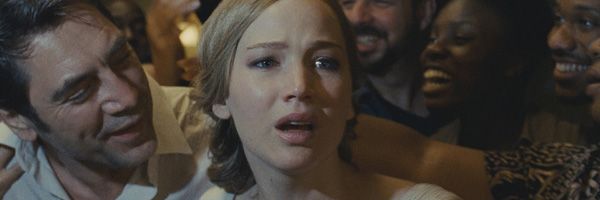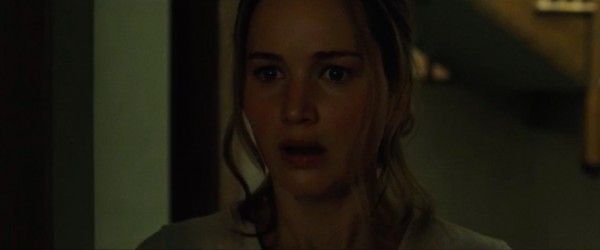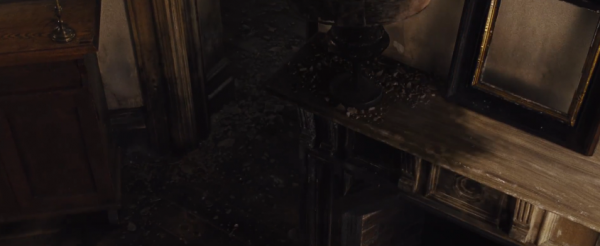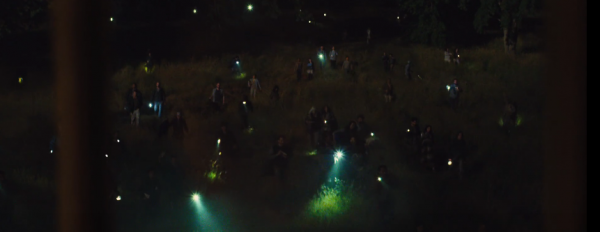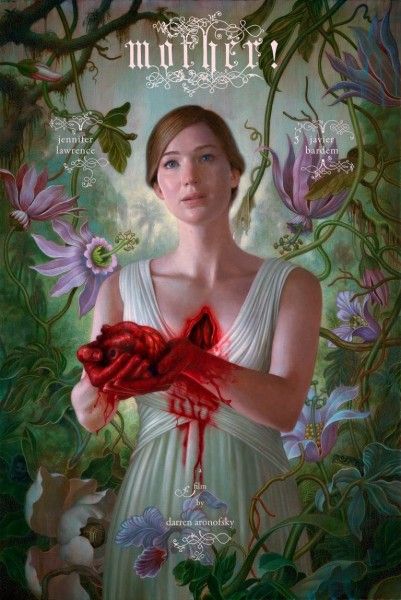Beware, this article goes into full spoilers for mother! Turn back if you haven’t seen the movie.
Filmmaker Darren Aronofsky decided to serve up some extra WTF with his latest film, mother!, and the movie’s ending is just as insane as everything that comes before it. While the film was shrouded in secrecy until its release, we now know that the entirety of mother! is an allegory. Jennifer Lawrence’s character is Mother Nature, Javier Bardem’s character is God, Ed Harris and Michelle Pfeiffer’s characters are Adam and Eve, and the entire movie is basically a retelling of the Bible. If you’re still confused about the allegory, Matt Goldberg does a great job of breaking down what it all means right here.
But here we wanted to specifically talk about the film’s ending and what it means. If you’ve seen the movie you know that, after the “flood” (i.e. the breaking of the sink), Lawrence’s character gets pregnant and she and the poet have been living a peaceful existence since the banishment of the “intruders”. But once the poet finishes his new poem, a horde of strangers come barging in, lavishing the poet with praise and acclaim. The poet’s new poem here is analogous to the New Testament of the Bible, and mother! then quickly runs through a “greatest hits” of humanity’s existence, focusing mainly on war, violence, and the creation of religion.
When it comes time for Mother to finally have their baby, she and the poet retreat to his upstairs office, which is basically the Garden of Eden/Heaven. She gives birth but refuses to let the poet take the baby to the throng of onlookers downstairs. Unfortunately, as sleep deprivation gets the best of her, the poet snatches the baby from her arms and gives it to the people. The baby, in this instance, is Jesus Christ. Those familiar with the New Testament knew what was coming next—the poet gives his baby to the people, who then kill it. Mother is horrified, even moreso when the people start eating the baby while crying (i.e. consuming the body of Christ as in communion, during which we remember Jesus’ sacrifice for our sins).
Mother gets trampled and beaten badly, almost to the point of death, before she makes her escape. The parallel here is humanity killing the planet (i.e. Mother Nature). But as we’re experiencing right now with climate change, Mother Nature fights back. Lawrence’s character screams in terror, shaking the house (i.e. Earth), before running to the basement where she lets her wrath loose in full fury. Fittingly, she chooses an oil drum as her weapon (i.e. the fossil fuel industry) and sets the entire place on fire, killing all of humanity.
The poet, being God/creator and thus immortal, survives and carries the badly burned Mother upstairs. She protests, asking him to stop, but he carries on opening her chest and pulling out another crystal like the one Pfeiffer and Harris’ characters broke at the beginning of the movie. It’s here that the gloomy ending comes into full view, as we realize Lawrence’s Mother was simply one of many Earths that God has created. Lawrence’s Mother tells him to stop, warning that humanity will always do this—turn on its creator, itself, and of course the Earth. But he strives to create, and thus he takes the crystal to the upstairs room, places it on the mantle, and the house restores itself and a brand new Mother wakes up in the bed, fresh-eyed and unaware that she’s just the next iteration of the cycle.
We spoke to Aronofsky himself at the Toronto International Film Festival last week, and he confirmed that this twist ending was always his plan when he started writing the movie:
“My first instinct when I first wrote it was that there would be that twist at the end, that final twist of just like, ‘Oh God it doesn’t end and this guy is just more and more of a narcissist and it just doesn’t end,’ and that would be like just another smack to the character and to the themes. How that lines up with the metaphor doesn’t fit perfectly, but I think that’s where the human story kind of takes over a little bit more and replaces the metaphor.”
Indeed, the first half of the movie is very close to the retelling of the Bible, while the second half gets a bit more loose with the metaphors. And yet, the message is the same: humans are on track to destroy the Earth, and thus ourselves, and Mother Nature is protesting, pleading with us to stop.
Didn’t expect that kind of horror movie with mother! did you?

